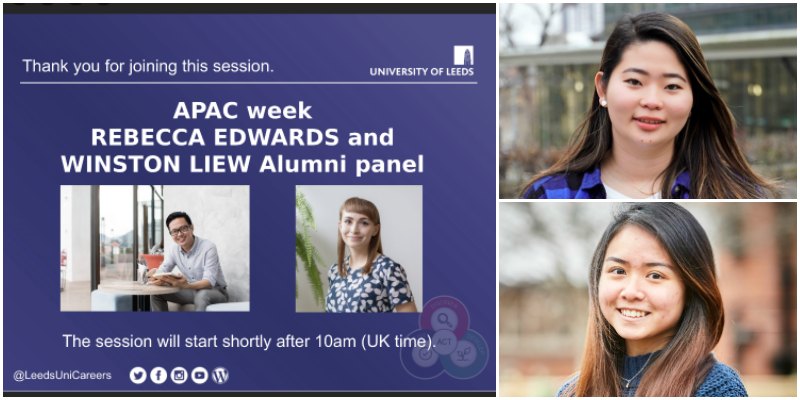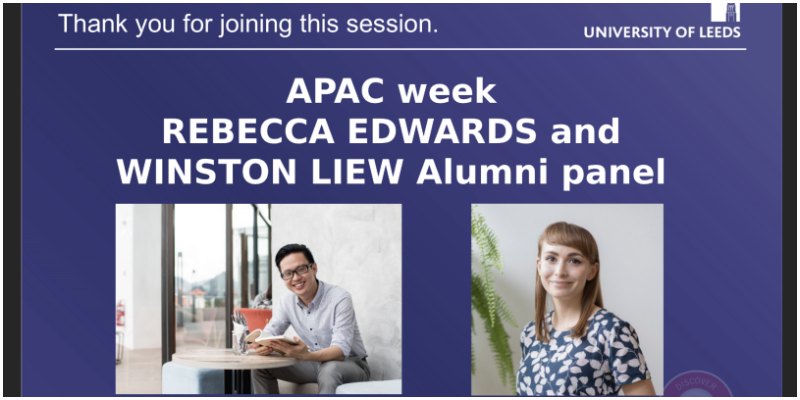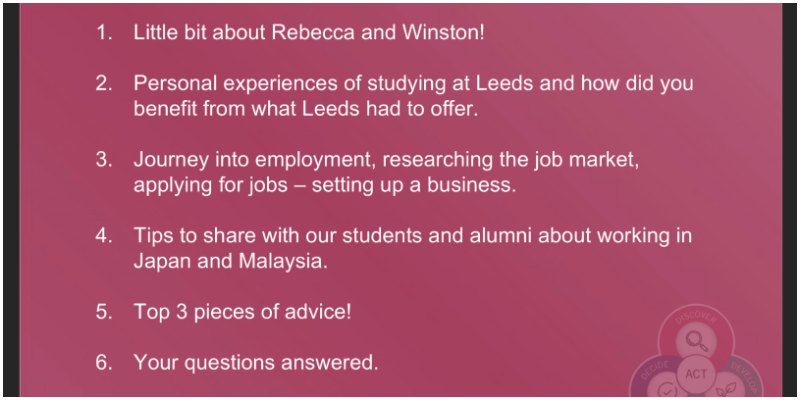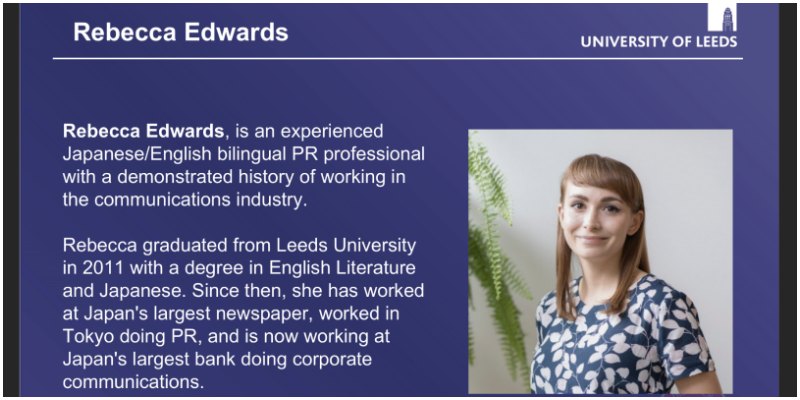Global Careers Events - Rebecca Edwards & Winston Liew, APAC week

This event is part of the Global Careers APAC week, organised by the University of Leeds Careers Centre. In this section, Haruka and I will share the key points and what we have learnt from this event.
1. Background on the speakers
Rebecca Edwards
Rebecca is an experienced English/Japanese bilingual PR professional with a demonstrated history of working in the communications industry. She graduated in 2011 from the University of Leeds with a degree in English Literature and Japanese. She has experiences in working at Japan’s largest newspaper company, and now she is in the corporate communications team at one of the Japan’s largest banks.
Winston Liew
Winston is from Malaysia, and he is a LLB Law graduate from the University of Leeds in 2011. In 2020, Winston was chosen as the Top 7 Global Finalist for the Global UK Alumni Awards for the Professional Achievement Category, recognising his amazing record of achievements. He is an entrepreneur, and a TEDx curator and coach.
2. Tips on securing a job and starting up your business in the APAC region
Rebecca Edwards
During the tips sharing session, Rebecca mentioned the process of job hunting in Japan while you are not physically there can be challenging, as many firms in Japan would much prefer to hire you in person. However, since we are now living in a different time, it might be easier now.
Build your network! According to Rebecca, when she first arrived in Japan, she obtained a work holiday visa where she had the chance to work in Japan and meet different people. Through mutual connection, she was able to have a conversation with someone from a firm is now working with.
Much like in other countries, applying for most jobs in Japan will require a resume, regardless of part-time/full-time or industry. Rebecca highlighted the importance of preparing a Japanese resume and have it reviewed by someone professional, as Japanese resumes have a fairly strict structure. Additionally, it is wise to be aware of what skills are sought after by the Japanese companies, so that you can use it to your advantage.
Winston Liew
According to Winston, the working culture in Malaysia is that many of the Malaysians plan their future based on what they have studied (creating their own circle), and that people who crosses industry are little. So, for example, if you have a degree in Law and you are interested in working in the creative industry, this will give you the extra edge, as you have skills that are highly transferrable and you are able to bring in a fresh perspective.
Winston also mentioned that students should focus on 3 currencies: performance currency, relationship currency and social currency.
• Performance Currency: Identify what you are good at and master it, employers/people around you will notice it and provide you with good recommendation (definitely a good sign!)
• Relationship Currency: Engage and build a good relationship with trust.
• Social Currency: Use your specialty to your advantage. We share to have a good image in front of others.
3. Top 3 advice from speakers
Here is a summary of the advice from Rebecca and Winston.
Rebecca Edwards
• Toughen your networking skills, have a broad connection.
‘‘You’ll never know who you will meet that might offer you opportunities.’’
• Aim high and take chances.
‘‘Feeling stagnant? Broaden up your horizon and take your first step.’’
• Be confident and don’t sell yourself short!
‘‘It’s ok to feel like an imposter sometimes, but be sure to tackle the Imposter Syndrome. You are better than you think you are.’’
Winston Liew
• Expand yourself.
‘‘The degree of what you study shapes how you think and allows you to gain specific skill sets, but it does not limit you.’’
• Speak confidently.
‘‘Don’t overthink how other people will think of you, focus on what you want to say, speak out and be confident. Language is a tool for you to express yourself and show your characteristics!’’
• Be immersive
In this section, Haruka will write about her opinions on the talk delivered by Rebecca Edwards.

After Rebecca graduated she joined a jet programme run by the Japanese government. In the programme, she worked as an English teacher in Nagasaki Japan. Though she was not interested to be a teacher, it was a good opportunity to improve her Japanese and get used to working in Japan.
After the programme, she undertook different jobs. Firstly, she went back to London and worked at a Japanese newspaper company. Then, she moved to Tokyo to work at a PR company. Finally, she started a job, which is also her current job, at a Japanese bank in London.
Based on her career experience, she gave some tips for current students, especially those who would like to work in Japan in the future. She recommended applying for a working holiday visa and spending some time in Japan. This is because she experienced difficulties in securing a job in Japan when she was in the UK. In her case, it was the jet programme that helped her think about future career in Japan. During the programme, she got some ideas of Japanese working style. At the same time, she made some friends who could help her write a CV. She explained that sometimes it is important to seek help from your friends to review your CV when applying for jobs in Japan. The second tip is to take N2 exam in JLPT since many companies have requirements of the Japanese language level. If you have it, you will get broader opportunities. At the same time, you do not have to worry about it so much. There are still some opportunities to work in Japan without good Japanese level. Based on this point, she suggested you email as many companies as possible to see which company show some interest in you. Of course, sometimes the answer might be ‘no’, but reflecting on her own experience, the experience itself was quite useful.
She also provided some advice to make university days more meaningful. It is important to join many activities such as societies and language exchange programmes. She joined Japanese society and found friends to live together in Tokyo. Also, she explained how useful the University Careers Centre is. She could find some interesting opportunities from the centre, which helped her understand what kind of job was suitable for her.
She also introduced some difficulties to work in Japan. She experienced cultural differences between UK and Japan. The Japanese tend to prefer consensus while the British tend to speak up their opinion. This is really interesting for me as well because I will experience similar difficulties if I choose to work in the UK since I am Japanese.
Her presentation was useful to understand the situation of working in Japan and the experience that will be helpful for our future career. What I found most important was to take up as many chances as possible to try everything. She tried to do her best in the opportunities that came her way. I think it helps her understand which job really fits her.
I will end my article with quotation from her message:
“Aim high. Try and tackle any opportunity. Take any chances.”
